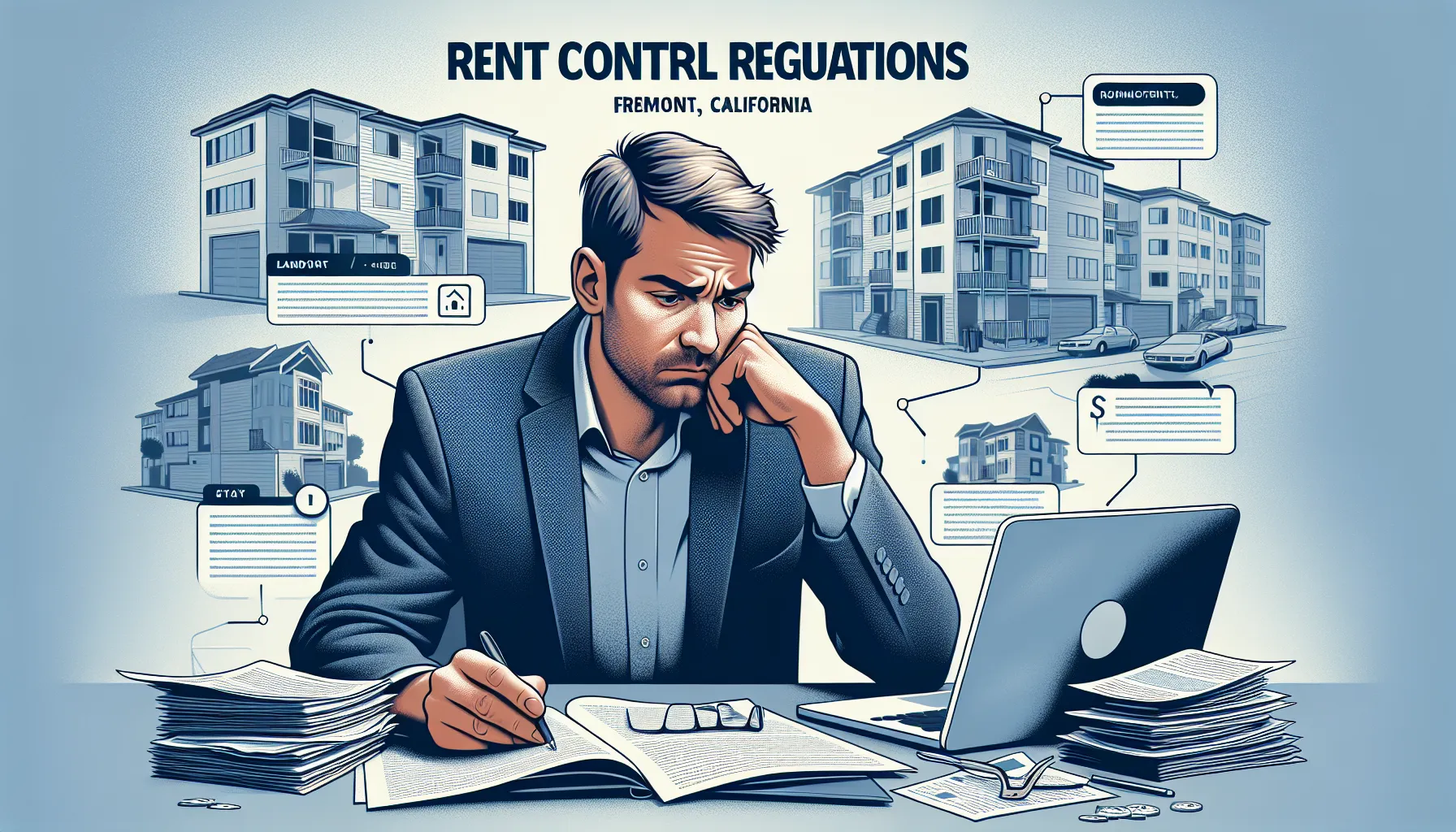Key Takeaways
- Rent control in Fremont regulates rent increases, requiring property owners to comply with caps tied to the Consumer Price Index (CPI) and meet just cause eviction standards.
- Property owners must stay updated on local rent control laws, including filing necessary notices, maintaining accurate records, conducting periodic inspections, and registering properties when required.
- Tenants are protected under the law with rights to proper notice for rent hikes, relocation assistance in specific cases, and legal action against non-compliance or retaliatory practices.
- Common landlord challenges include tracking regulatory changes, calculating lawful rent increases, and adhering to just cause eviction processes without error.
- Resources for compliance include Fremont’s city government website, community workshops, and legal professionals specializing in landlord-tenant law to ensure clarity and avoid penalties.
- Proactive management of compliance through reliable tools, documentation, and legal guidance protects investments and fosters strong landlord-tenant relationships.
Rent control compliance can feel overwhelming, especially with the rules and regulations constantly shifting. If you’re a property owner in Fremont, you might wonder how to stay on top of these requirements while maintaining a smooth rental operation. Are you confident your property meets all the necessary standards, or does the thought of potential penalties keep you up at night?
I understand how challenging it can be to balance compliance with managing your investments. Keeping tenants happy while adhering to local laws requires more than just good intentions—it demands attention to detail and a clear understanding of the guidelines. What steps are you taking to protect your property and avoid costly mistakes? Let’s explore how you can stay compliant and safeguard your investment without unnecessary stress.
Understanding Rent Control Compliance In Fremont
Rent control compliance in Fremont requires thorough understanding to manage properties successfully. Staying informed about the local regulations can protect your investments and foster better relationships with tenants.
What Is Rent Control?
Rent control limits how much landlords can increase a tenant’s rent over time. It’s a regulation intended to keep housing affordable and accessible for renters. Do you know how it affects your specific property or rental agreements? Understanding this framework is essential to maintain legal and fair practices while avoiding violations.
Overview Of Fremont’s Rent Control Policies
Fremont’s rent control policies are structured to regulate rent increases for certain properties and ensure tenant protection. Ordinances often include caps on annual rent increments, require just cause for evictions, and may involve mandatory registrations or filings. Are you aware of these rules and how they impact your leasing strategies? Remaining compliant requires regular updates and attention to any changes in the city’s laws.
Key Requirements For Rent Control Compliance In Fremont

Rent control rules in Fremont aim to balance tenant protections with fair practices for property owners. Staying informed about the regulations can help avoid unexpected issues while maintaining positive landlord-tenant relationships.
Responsibilities Of Property Owners
Property owners in Fremont must comply with specific guidelines to meet rent control standards. Annual rent increases cannot exceed the maximum percentage established by local laws. For example, adjustments are often tied to the Consumer Price Index (CPI) with a set cap to prevent excessive hikes.
Evictions require just cause under Fremont regulations, such as non-payment of rent or lease violations. Filing all necessary notices properly is critical to prevent legal challenges. Additionally, some properties may need to be registered under mandatory rent control programs. Owners should confirm if this applies to their rental.
Adhering to inspection requirements is another key responsibility. Conducting periodic inspections ensures properties remain habitable and free from significant repair issues. Are you keeping accurate records of repairs, notices, and lease agreements? Reliable documentation supports compliance and protects against disputes.
Tenant Protections Under The Law
Fremont’s rent control laws offer tenants various safeguards. Tenants are entitled to proper notice before any rent increases or changes in the rental agreement. Advance written notices, typically 30-90 days depending on the increase rate, are legally required.
Relocation assistance may be necessary for tenants in specific situations. For example, an eviction for major renovations or converting the property into owner-occupied use may come with financial aid obligations. Failing to provide relocation payments when applicable could result in penalties for property owners.
Tenant protections also include the right to challenge unfair practices. Fremont mandates clear guidelines to prevent retaliatory actions against tenants who exercise their rights. Do you routinely review your rental practices to remain consistent with these legal requirements? Staying proactive helps reduce risks and maintains trust.
Challenges In Ensuring Compliance

Handling rent control compliance in Fremont involves many challenges for property owners and tenants alike. Staying informed and proactive can help reduce risks and protect investments.
Common Issues Faced By Landlords
Landlords often struggle to keep up with changes in rent control laws. These updates can affect rent increases, eviction procedures, and registration processes. Missing even a small adjustment in the regulations could result in fines or legal disputes. Property owners may ask, “Am I following the latest rules?”
Another common challenge is calculating rent increases tied to the Consumer Price Index (CPI). Miscalculations can lead to disputes with tenants or violations. How confident are you in verifying CPI-based adjustments? Proper documentation adds another layer of complexity. Landlords must maintain records of rent increases, notices, and lease agreements. Gaps in paperwork can weaken legal defenses or erode trust with tenants.
Finally, eviction rules require significant attention. Evictions in Fremont must meet just cause requirements, such as nonpayment or lease violations. Failing to follow these steps can delay the process or expose owners to penalties.
How Tenants Can Navigate Non-Compliance
Tenants have rights if property owners fail to comply with rent control laws. Examples include excessive rent increases or improper evictions. Familiarity with Fremont’s requirements, like annual rent caps and just cause eviction rules, empowers tenants to protect themselves. Have you checked if recent rent increases follow limits?
Proper communication is key. Tenants should address concerns with landlords in writing, creating a record of interactions. This helps resolve misunderstandings and supports claims if issues escalate. Are your concerns documented thoroughly?
In unresolved situations, tenants can seek legal advice or contact housing authorities. Both routes can provide clarity on the options available. Collaborating with trusted professionals ensures tenants avoid unnecessary stress and find the right resolution for their circumstances. Are you aware of the resources to rely on if challenges persist?
Tools And Resources For Compliance

Access to reliable tools and resources simplifies the process of managing rent control requirements in Fremont. With the right support, staying informed about regulations and meeting your obligations becomes less stressful.
Fremont Rent Control Resources
Many online platforms and local organizations offer resources to assist with rent control compliance. Fremont’s city government website provides detailed information on rent increase limits, required documentation, and available tenant protections. These details help landlords understand their responsibilities.
Community workshops or seminars often cover local housing laws, including rent control policies. These events create opportunities to ask questions and learn directly from experts. Additionally, subscription-based compliance tools can track Consumer Price Index (CPI) changes, calculate permissible rent increases, and monitor deadlines for important notices.
Have you explored free guides or templates that simplify issuing compliant notices or maintaining accurate records? Leveraging these materials can save time and reduce the risk of errors.
Seeking Legal Guidance
For complex or unclear situations, consulting with a legal professional provides clarity. Attorneys specializing in landlord-tenant law can review your practices, address concerns about compliance, and advise you on dealing with disputes or tenant claims.
If you’re hesitant to invest in legal advice, consider the consequences of non-compliance, such as hefty fines or prolonged legal battles. Is defending potential lawsuits more affordable than preventing issues altogether? Some local housing agencies might also connect property owners with low-cost legal resources.
Would personalized legal support provide the confidence to manage your properties while avoiding unnecessary risk? Remember, proactive measures protect both investments and peace of mind.
Conclusion
Navigating rent control compliance in Fremont requires diligence, awareness, and the right resources. Staying informed about evolving regulations and leveraging tools or expert guidance can make a significant difference in protecting your investment. By prioritizing compliance and fostering positive relationships with tenants, property owners can create a more stable and successful rental experience.
Frequently Asked Questions
What is rent control, and how does it work in Fremont?
Rent control limits how much landlords can increase a tenant’s rent annually to ensure housing remains affordable. In Fremont, rent increases are tied to the Consumer Price Index (CPI) with a capped percentage. Additional guidelines include just cause requirements for evictions and mandatory advance notices or registrations.
How often can landlords increase rent under Fremont rent control laws?
Landlords in Fremont can increase rent annually, but only within the CPI-based limits set by local regulations. Any increase beyond this must comply with specific exemptions or legal conditions.
What are the risks of not complying with rent control laws in Fremont?
Non-compliance can result in fines, legal disputes, or tenant-filed complaints. Property owners may also face penalties like relocation assistance costs or lawsuits, making strict adherence essential.
What protections do tenants have under Fremont rent control policies?
Tenants are protected by rent caps, rights to advance notice for increases, just cause eviction requirements, and relocation assistance in certain cases. They can also challenge unfair practices by contacting housing authorities.
How can property owners in Fremont calculate permissible rent increases?
Property owners should use the annual CPI percentages to calculate allowable rent increases. Online compliance tools or expert guidance can help ensure accuracy.
What can tenants do if a landlord violates rent control laws?
Tenants can file complaints with housing authorities, document violations, and seek legal advice. They are also encouraged to communicate concerns in writing to their landlord.
Are landlords required to provide relocation assistance in Fremont?
Yes, in some cases, such as no-fault evictions, landlords must provide relocation assistance to tenants to comply with Fremont rent control regulations.
How can landlords stay updated on changing rent control regulations?
Landlords can stay informed by attending community workshops, subscribing to compliance tools, consulting with local legal experts, and regularly reviewing updates from Fremont housing authorities.
What documentation is necessary for rent control compliance in Fremont?
Landlords should maintain detailed records of leases, rent increases, eviction notices, and inspections. Proper documentation ensures compliance and helps resolve disputes effectively.
Is legal guidance essential for managing rent control compliance?
Yes, seeking legal advice from attorneys specializing in landlord-tenant law can help address complex issues, ensure compliance, and avoid costly disputes or penalties.
